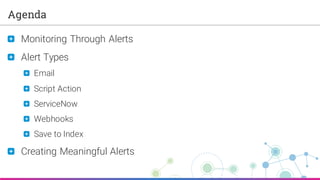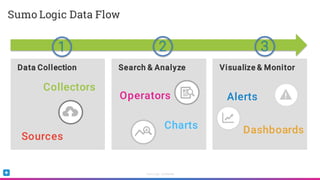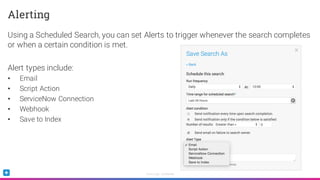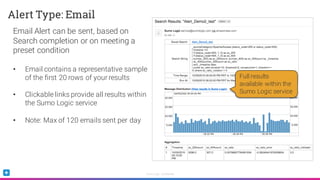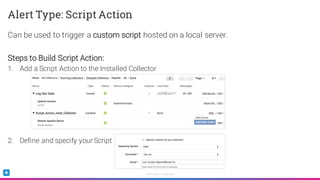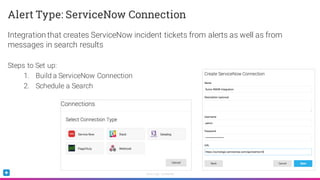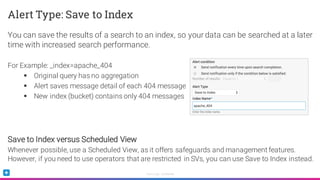How to Webinar: Monitoring through Alerts
- 1. Sumo Logic Confidential Monitoring through Alerts January 2016 How-To Webinar
- 2. Sumo Logic Confidential Agenda Monitoring Through Alerts Alert Types Email Script Action ServiceNow Webhooks Save to Index Creating Meaningful Alerts
- 3. Sumo Logic Confidential Sumo Logic Data Flow Data Collection Search & Analyze Visualize & Monitor Alerts Dashboards Collectors Sources Operators Charts 1 2 3
- 4. Sumo Logic Confidential Alerting Using a Scheduled Search, you can set Alerts to trigger whenever the search completes or when a certain condition is met. Alert types include: • Email • Script Action • ServiceNow Connection • Webhook • Save to Index
- 5. Sumo Logic Confidential Saving and Scheduling an Alert 1. Save your Search 2. Schedule the Search 3. Specify frequency and time range 4. Specify Alert condition & threshold 5. Specify Alert Type and details
- 6. Sumo Logic Confidential Alert Type: Email Email Alert can be sent, based on Search completion or on meeting a preset condition • Email contains a representative sample of the first 20 rows of your results • Clickable links provide all results within the Sumo Logic service • Note: Max of 120 emails sent per day Full results available within the Sumo Logic service
- 7. Sumo Logic Confidential Alert Type: Script Action Can be used to trigger a custom script hosted on a local server. Steps to Build Script Action: 1. Add a Script Action to the Installed Collector 2. Define and specify your Script
- 8. Sumo Logic Confidential Alert Type: Script Action Steps to Schedule Script Action: 1. Create, save and schedule the query for the data in question 2. Select Script Action as your Alert Type and provide your newly created Script Action Key Points • Your script is hosted where your installed collector lives • Your script has access to the search results (JSON format) • Your script can call any other scripts • Good fit for connecting to on-premise systems behind firewall
- 9. Sumo Logic Confidential Alert Type: ServiceNow Connection Integration that creates ServiceNow incident tickets from alerts as well as from messages in search results Steps to Set up: 1. Build a ServiceNow Connection 2. Schedule a Search
- 10. Sumo Logic Confidential Alert Type: Webhooks Target systems that support incoming webhook/HTTP alerts. Easy cloud-cloud integration. Steps to Set up: 1. Build a Webhook Connection • Templates for common systems 2. Schedule a Search
- 11. Sumo Logic Confidential Alert Type: Save to Index You can save the results of a search to an index, so your data can be searched at a later time with increased search performance. For Example: _index=apache_404 § Original query has no aggregation § Alert saves message detail of each 404 message § New index (bucket) contains only 404 messages Save to Index versus Scheduled View Whenever possible, use a Scheduled View, as it offers safeguards and management features. However, if you need to use operators that are restricted in SVs, you can use Save to Index instead.
- 12. Sumo Logic Confidential Best Practices: Good Alerts, Bad Alerts To be meaningful, Alerts should be: • Actionable – Alerts should have an associated playbook detailing steps to take • Directed – Alerts should be directed to an individual or group accountable for handling it • Dynamic – Instead of static thresholds, smart Alerts can track outliers, moving averages and/or abnormal increases. • Blog Post: 2 Key Principles for Creating Meaningful Alerts
- 13. Sumo Logic Confidential Summary Alert Types include: Email Script Action ServiceNow Webhooks Save to Index Alerts should be Actionable and Directed Meaningful Alerts use Dynamic Thresholds


